Four toilets, built in 2013 by the organisation Candice Andisiwe Sehoma founded, are still flushing, although floods of raw sewage flow daily through the streets of Alexandra. (Sean Christie)
When HIV cases surged in South Africa in the late 1990s, Candice Andisiwe Sehoma was still in single figures, playing mgusha with her siblings and cousins. She had zero awareness of the HIV denialism of South African president Thabo Mbeki, and his health minister Manto Tshabalala-Msimang, and how this threatened the lives of millions of people living with HIV who lacked access to treatment.
Nor did she know that many thousands of activists were rising up in response, notably the rank and file of the Treatment Action Campaign (TAC), working alongside some devoted clinicians across the country, and patient advocates around the world.
Many NGOs joined the HIV fight as well, including Médecins Sans Frontières/Doctors Without Borders (MSF), the organisation Sehoma works for.
“I only learned about this stuff when I joined in 2017,” she says, pausing to order off the menu of River Park Cafe in Alexandra. At 11am we are the first customers, privy to the concert of banging pots and loud banter in the open kitchen, which outdoes the din of the street. The aroma of boiling skopo fills the space. We both go for the beef stew.
Sehoma, who lives in Alberton, had asked to meet in Alex partly for reasons of organisational history.
“In 1999, when representatives of MSF came to South Africa with the aim of establishing a prevention of mother to child transmission programme, Alex was the community they were looking at,” Sehoma explains.
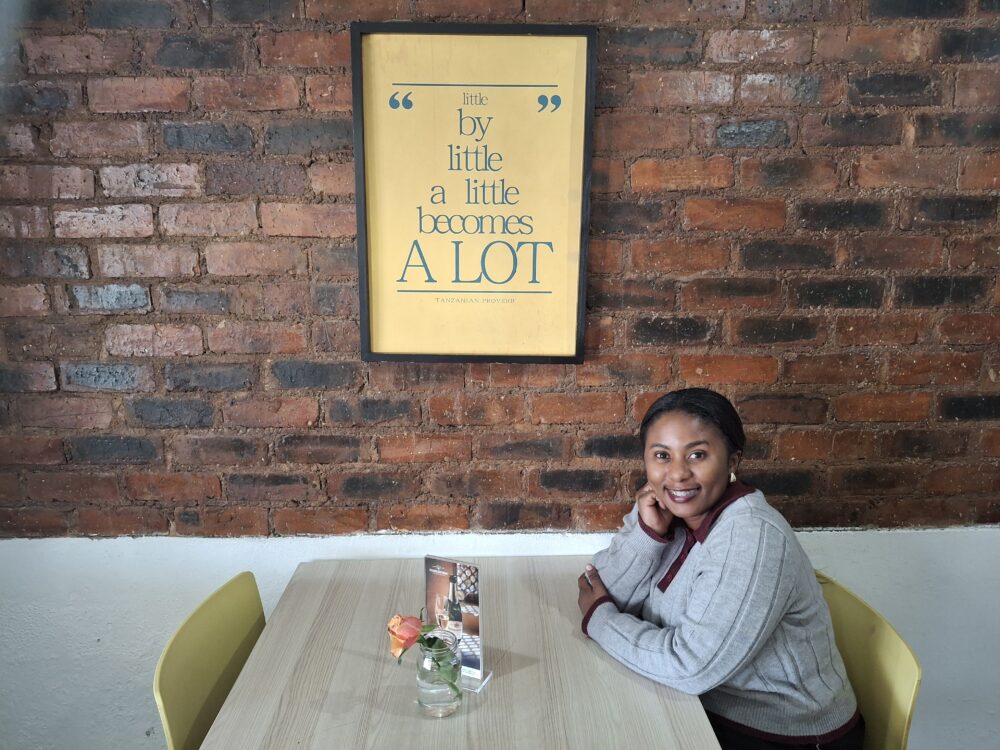 At the River Park Cafe in Alexandra. (Sean Christie)
At the River Park Cafe in Alexandra. (Sean Christie)
The organisation, she says, soon found its way blocked by Tshabalala-Msimang — the minister was dead against the use of zidovudine (AZT), one of the first antiretrovirals (ARVs), and the therapy on which the prevention of mother to child transmission protocol was based.
With MSF on the brink of exiting the country, TAC founder Zackie Achmat implored its representative, former general director Eric Goemaere, to travel to the Western Cape to meet the head of the provincial Aids programme, Fareed Abdullah, who had been a prominent political activist before joining government. It turned out Abdullah was more committed to healthcare reform and improving the lives of patients than he was to adhering to the denialist policies of his political masters and he gave MSF permission to establish an ARV programme in Khayelitsha.
That, says Sehoma, was the start of an extraordinary alliance of dissident government officials on the one hand, and on the other, TAC activists and MSF clinicians, nurses and counsellors.
“They did some crazy things,” she says, drawing out the vowel sounds.
“They kept the drugs in car boots parked down the road so as to avoid having it confiscated by the police. They forced pharmaceutical companies to drop patents on lifesaving medicines. It’s a story that gives me goosebumps.”
By the time Sehoma joined MSF in 2017, the South African government was running the world’s largest ARV programme. Largely thanks to this, life expectancy had risen to 65 years from its 2004 low of 52 years.
“It was a strange time to be entering the space of HIV advocacy. The obvious gaps in treatment had been addressed,” says Sehoma, who ultimately found purpose with MSF Access, a unit that grew out of MSF’s Campaign for Access to Essential Medicines, which was established in 1999 with the money MSF received for winning that year’s Nobel Peace Prize.
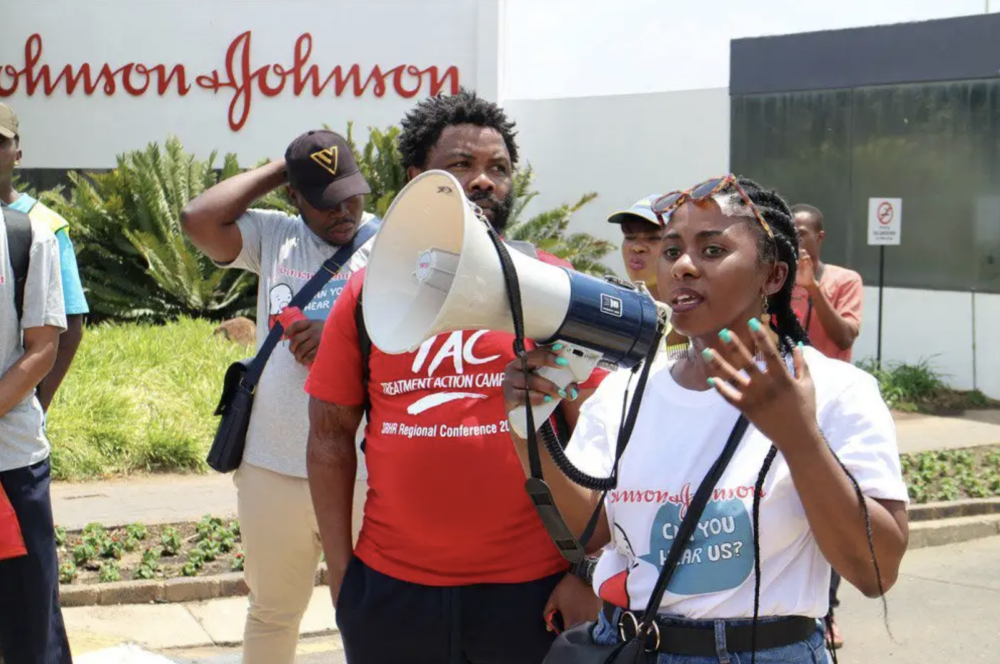 The advocacy efforts of MSF Access, spearheaded in South Africa by Candice Andisiwe Sehoma, won the South African government a 40% drop in the price of bedaquiline, a lifesaving multidrug-resistant TB drug manufactured by Johnson & Johnson. (Supplied)
The advocacy efforts of MSF Access, spearheaded in South Africa by Candice Andisiwe Sehoma, won the South African government a 40% drop in the price of bedaquiline, a lifesaving multidrug-resistant TB drug manufactured by Johnson & Johnson. (Supplied)
“MSF Access arose from a recognition that high medicine prices linked to patents were preventing people from accessing ARVs,” Sehoma says, although in time its focus would broaden to include TB, hepatitis C, malaria, sleeping sickness and more.
Sehoma first set to work on a new multidrug-resistant tuberculosis drug called bedaquiline, which vastly improves the success rate of treatment.
“The primary patent for bedaquiline was set to expire in July 2023, but manufacturer Johnson & Johnson (J&J) was busy extending its market monopoly in many countries through secondary patents, which are often granted for small changes to already-patented medicines.
“In the industry it is known as ever-greening, a strategy pharmaceutical companies employ to extend their monopolies on drugs,” says Sehoma, who convinced well-known TB-survivor-turned-patient-advocate Phumeza Tisile to fly to India to file a challenge to J&J’s secondary patent application.
The stunt succeeded — India’s patent office denied J&J a secondary patent, meaning that Indian pharmaceutical companies would be able to produce a generic version of bedaquiline once the primary patent expired. In response, J&J slashed the price of bedaquiline by more than half for dozens of countries, with South Africa getting a 40% discount.
“I remain incredibly proud of my part in that,” says Sehoma, for whom the fight for better medicines and healthcare is deeply personal.
How to build a toilet
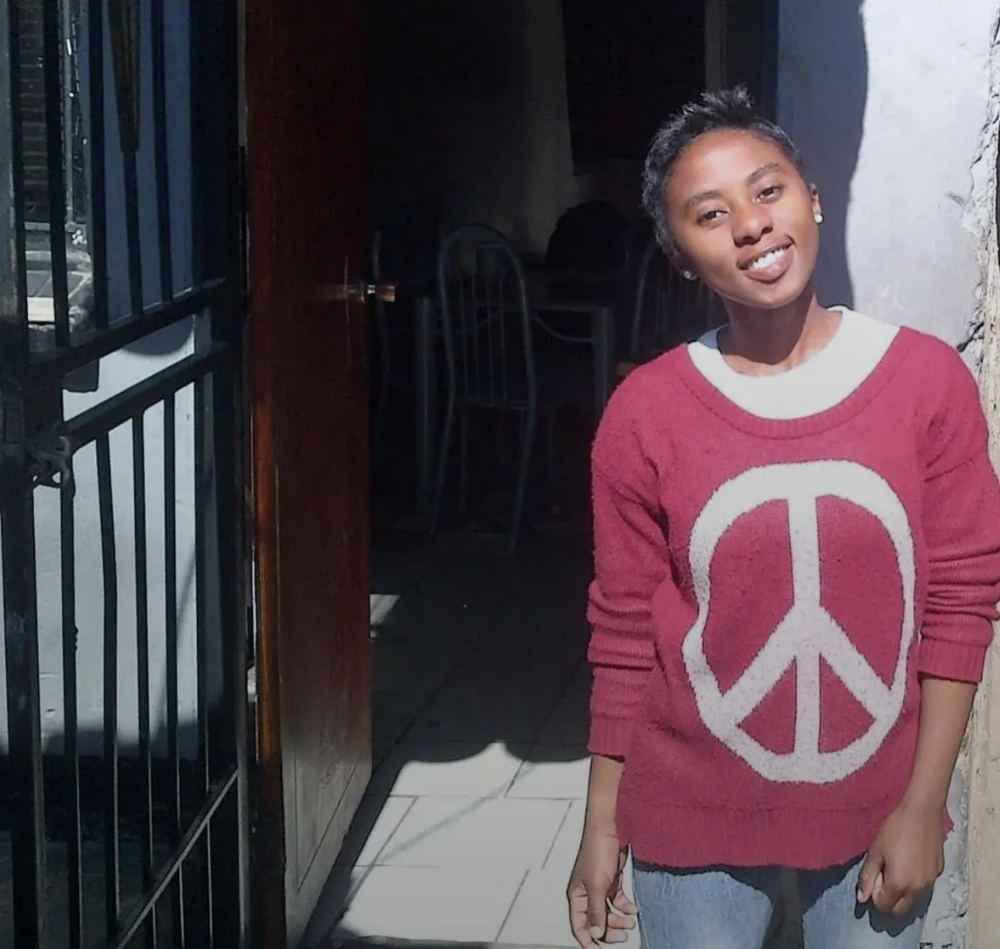 Sehoma outside the single-room home in Alexandra where she lived with her mother until the age of 18. (Supplied)
Sehoma outside the single-room home in Alexandra where she lived with her mother until the age of 18. (Supplied)
Sehoma grew up in Alex, in a single-room home on the corner of Eighth Avenue and Vincent Tshabalala, which Sehoma, like most Alexandrans, still calls “London Road”. She lived with her mother and was the eldest of three siblings, although her youngest sibling died in 2011.
“Losing our sister had a huge impact. I was tormented by the thought that she might still be alive if we’d had access to better healthcare, and unfortunately, I believe this to be true today, because there was a time when my own daughter had the same health issues, but because we have medical aid, we are able to deal with the problem,” says Sehoma, who led what she describes as a “bipolar existence”, due to her mother’s devotion to the idea that she should be educated outside of Alexandra, in private schools.
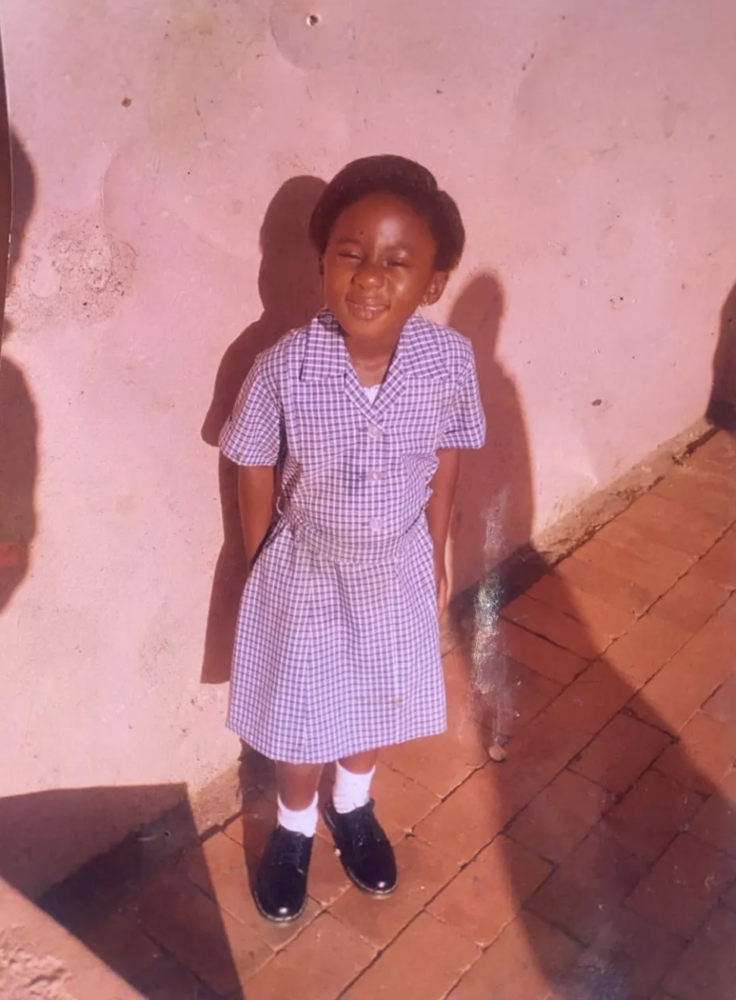 Sehoma in Bramley Primary School uniform, the school her mother was determined she attend, to be out of Alex some of the time. (Supplied)
Sehoma in Bramley Primary School uniform, the school her mother was determined she attend, to be out of Alex some of the time. (Supplied)
“To begin with, I attended Zenzeleni Primary School down the road but it wasn’t long before my mother paid for me to attend Bramley Primary in the suburbs outside Alex, and for high school, I went to Waverly Girls.
“The contrast between affluent Waverly and our crowded yard in Alex made me question the unfairness that’s coded in our society,” says Sehoma, who came to fully appreciate her mother’s sacrifice after she matriculated.
“Not long afterwards, she was able to buy a bigger place, and move away from Alex.”
Sehoma attended the Rose Act Saturday School, which provided extra maths and English lessons, but also espoused an ethos of community service, and provided her with other invaluable resources, such as a life coach. It got her to thinking about how she could make a difference in her own community and the answer came on a visit to her grandmother in the Eastern Cape.
“We always had bucket toilets growing up, and so I had the idea of building a flushing toilet for the residents in our yard.”
In her book The Big Necessity, the Unmentionable World of Human Waste and Why it Matters, British author Rose George writes that, “In South Africa, sanitation has been political for decades. During apartheid, water and latrine supplies were distributed according to colour.
“White settlements, even poor ones, usually got flush toilets and waterborne sewerage. Blacks had bucket latrines — a bucket with a seat on top or nothing. By the time democracy came to South Africa in 1994, a relatively rich country had, for reasons of racism and politics, desperate sanitation figures comparable with those of poorer African countries with fewer resources.”
Sehoma admits she “had no clue how to build a toilet”, but she was determined to do it. In January 2012, she pressed her uncle, who was well known in the community, to call a meeting.
“We explained the idea and convinced the residents to contribute towards materials. Among them were plumbers and builders, which saved us labour costs. By June that year we had everything, and by the end of the year, we had two flush toilets. Everyone was happy and took so much pride in having those toilets. Later on, the bucket toilets were taken out,” she says.
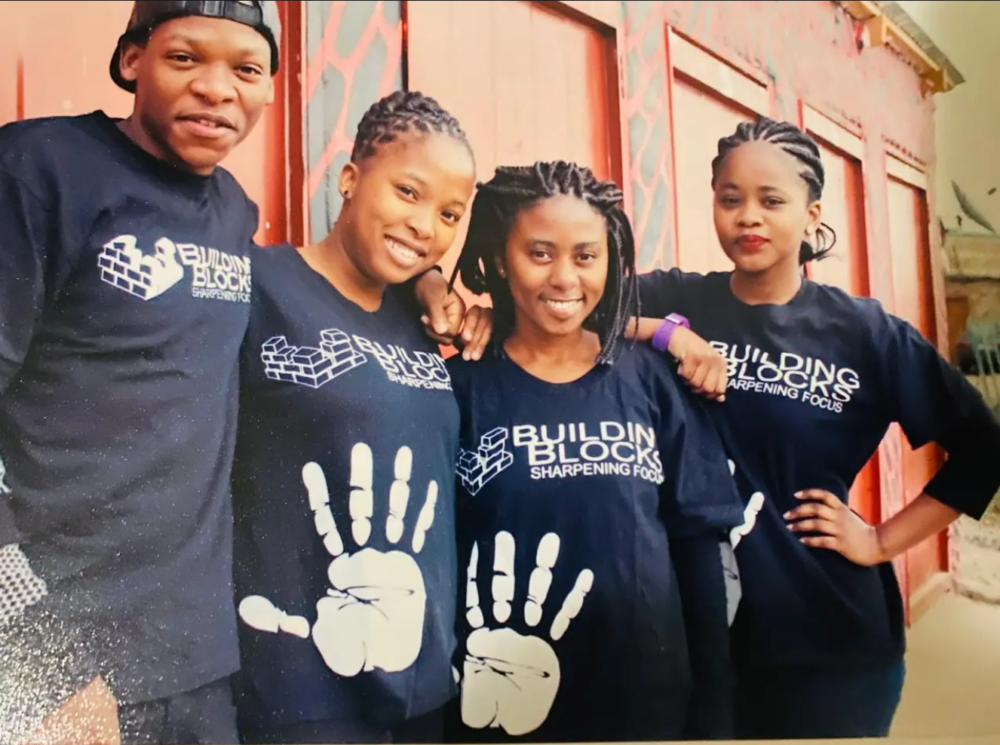 Sehoma founded Building Blocks with three friends she met at Rose Act Saturday School. From left, Lukhanyo Nako, Itumeleng Mtebele, Sehoma and Pearl Ngoasheng. (Supplied)
Sehoma founded Building Blocks with three friends she met at Rose Act Saturday School. From left, Lukhanyo Nako, Itumeleng Mtebele, Sehoma and Pearl Ngoasheng. (Supplied)
The success of the project spurred Sehoma to register, with three friends, a foundation called Building Blocks, which set out to do the same for other communities.
“We would identify communities that had those bucket toilets and the next step was to find someone with enough clout to secure peoples’ buy-in. It wasn’t difficult because everyone understood the problem. We made sure the community did the work themselves, we merely supported [them] with materials and planning. In this way, everyone had a sense of ownership.”
In total, Building Blocks built 22 flush toilets. Sehoma oversaw this work while studying, first psychology and later development studies. By the time she joined MSF as an intern, she had already learned, through her own initiative, all of the most important tenets of humanitarian work, from consultation to community ownership. Little wonder her star rose quickly.
Medicines shouldn’t be a luxury
Sehoma was recently appointed to the position of regional adviser for MSF Access, with a purview that includes Southern and East Africa.
“My current focus is diabetes. It’s a different order of challenge. Gone are the days of 10 000 person marches, calling for affordable ARVs, but the MSF Access slogan, “Medicines Shouldn’t be a Luxury”, remains as relevant as it was in the early 2000s,” she says.
On November 14 2024 — World Diabetes Day — Sehoma found herself at the head of a 500-person picket outside the Johannesburg offices of pharmaceutical giant Novo Nordisk, protesting the company’s decision to discontinue the production of insulin pens, the means of administering insulin preferred by most diabetes patients.
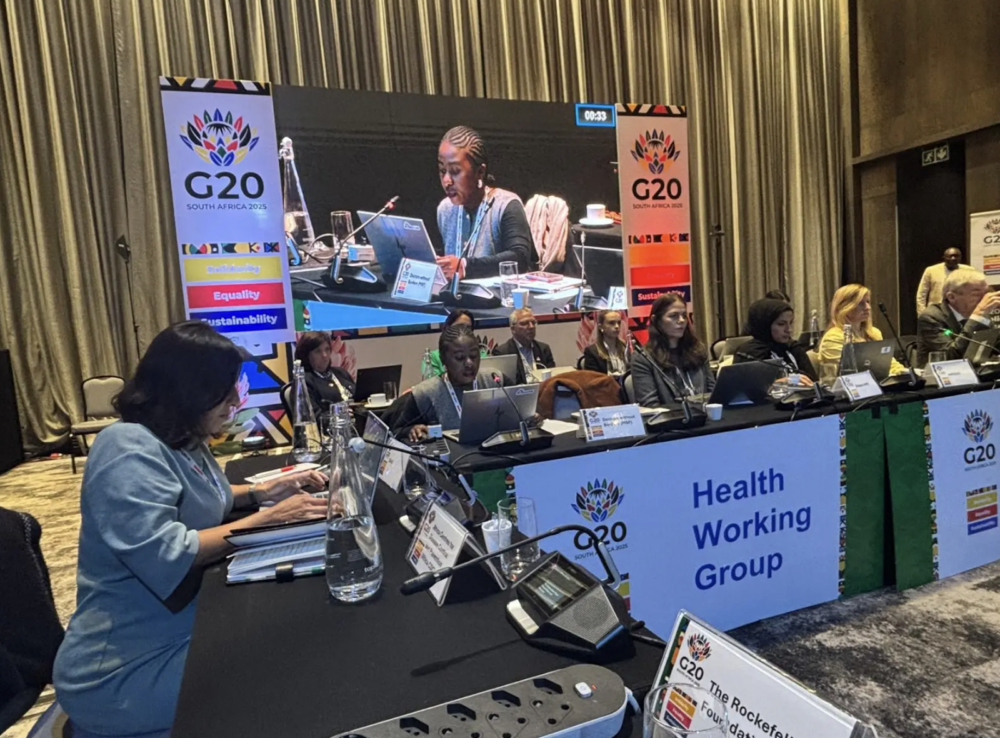 At the G20 health working group, hosted by South Africa earlier this year. (Supplied)
At the G20 health working group, hosted by South Africa earlier this year. (Supplied)
“When South Africa’s health system ran out of insulin pens in 2024, the health department was slammed, but in fact the shortage arose because the main supplier, Novo Nordisk, has shifted from producing human insulin pens to more profitable GLP-1 medications like Ozempic, which are mainly prescribed to aid in weight loss,” says Sehoma, who invited the TAC to join the action.
“A lot of TAC members showed up, partly because this issue affects many of the organisation’s members but also out of solidarity. In this time of crisis for civil society, I believe there is a need for activists to step out of their silos in order to support each other,” Sehoma says, adding that MSF Access and other advocacy organisations are increasingly working with, and through, government departments and regional bodies.
“There’s an irony to this, given how it started, with the government at odds with TAC and MSF over ARVs. Today, especially when it comes to access to medicines, we often find ourselves on the same page.
“With J&J and bedaquiline, it was a Competition Commission investigation triggered by MSF and the Health Justice Initiative that resulted in the price cut in South Africa, which saved government a fortune. We went the same route with insulin pens. In early 2025, the Competition Commission launched an investigation into insulin pen manufacturers Novo [Nordisk] and Sanofi Aventis.”
Our take-away boxes arrive, with complimentary dombolo. Before parting, Sehoma led the way to a row of four toilets built in 2013.
“I hope they’re still okay — I haven’t been this way in years,” she says, and although raw sewage was streaming down the street, filling crater-like potholes, we found the toilets in perfect working order.

This story was produced by the Bhekisisa Centre for Health Journalism. Sign up for the newsletter.